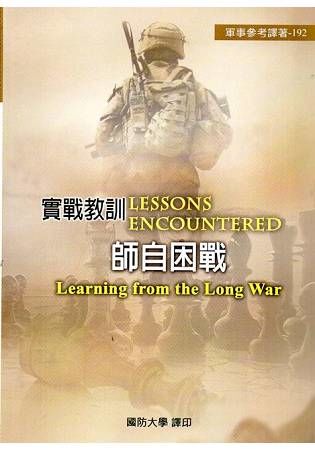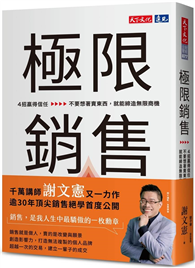| FindBook |
|
有 1 項符合
richard d. hooker的圖書 |
 |
$ 472 ~ 527 | 實戰教訓 師自困戰
作者:(Richard D. Hooker,Jr.,Joseph J. Collins) / 譯者:張競 出版社:國防部國防大學 出版日期:2016-12-01 語言:繁體中文 規格:精裝 / 638頁 / 16 x 21.5 cm / 普通級/ 單色印刷 / 初版  共 5 筆 → 查價格、看圖書介紹 共 5 筆 → 查價格、看圖書介紹
|
|
|
吾人探索未知之心永不終止 在吾人探索過程終點 將會再度回到吾人初始之地 始能首度領悟此地之意 —艾略特,“小吉丁” (譯註:小吉丁為英格蘭某小鄉村地名,本詩為英詩經典名作) 未自以往戰爭中獲取教訓,將會導致災難性之後果;未來主掌國家安全之領袖們,很可能無法具有前述艾略特所窺破之心靈慧眼,但仍須盡力從烽火連年之冗長戰事中習得教訓。茲此之念,參謀首長聯席會議主席鄧普賽上將,在其第二任期,對聯合部隊兵力所下達之戰略指導要點中,要求高階官員「運用戰時所歸結之經驗教訓,提供最佳軍事建言,期能策訂美國政策目標以及戰略指導。」而當時美國國防大學校長陸軍少將馬丁則是寫下: 除能繼續分析與教授自以往戰爭所獲致之經驗教訓,(國防大學)必須探討、解析以及教授期程超過十年以上戰爭,在戰略與野略層級上所能歸結之經驗教訓。此等工作將對改善戰略性領導品質,以及本校畢業生工作表現至關緊要;並有助於建構最新國家與軍事安全戰略,並能因應未來需求,創新作戰理念。本書係針對目前在阿富汗與伊拉克已邁入第14年之困戰,作出初步評估報告。由於911事件所產生之後續戰事,原先包括針對凱達組織加以清剿,在阿富汗與伊拉克之主要軍事衝突,以及在非洲之角周邊區域、菲律賓境內,以及遍佈全球空中與海上之作戰行動。本書作者在此僅針對在阿富汗與伊拉克之軍事作戰,其中之美軍主要作為;期能為未來資深軍官、其所屬顧問,以及其他涉及國家安全決策者提供參考資料。但是從其他方面來說,本書亦可作為就讀聯合作戰專業教育課程之學官使用教材,以陶冶其未來在戰略層面工作所需之學養。儘管本書內容將聚焦於影響戰略層級決心,以及陸上作戰發展相關人士間之互動;但是其確實認知到美國之所以能夠具有強權大國地位,並且得以充份發揮其地面部隊實力,係因美國海軍與空軍能夠分別宰制其各自所負責之作戰領域。此項評估報告始自兩組針對阿富汗與伊拉克戰爭之議題,而其中最為關鍵之分別課題,是由參謀首長聯席會議主席本人所提:「吾人所得為何」、「吾人所失為何」、「美國應對911事件所採作為,特別是在阿富汗與伊拉克之戰爭,所付代價為何」以及「前述課題所得答案,對於資深軍事領導階層官員來說,未來如何應用在策訂國家安全戰略與國家軍事戰略。」而第二組議題則是接續前一組議題:在阿富汗之「持久自由作戰」與在伊拉克之「伊拉克自由作戰」與「更新破曉作戰」,所能獲得戰略性之「總結教訓」(或是如同英國人及本書作者群所主張之「實戰教訓」)為何?
We shall not cease from exploration And the end of all our exploring Will be to arrive where we started And know the place for the first time. —T.S. Eliot, “Little Gidding” Not learning from wars can be catastrophic. The next cohort of national security leaders may not achieve the sublime mental state envisioned by T.S. Eliot, but they must make every effort to learn the lessons of the Long War. For that reason, in his second term’s Strategic Direction to the Joint Force, Chairman of the Joint Chiefs of Staff General Martin E. Dempsey charged senior officers “to apply wartime lessons learned to provide best military advice and inform U.S. policy objectives and strategic guidance. Major General Gregg F. Martin, USA, then–President of National Defense University (NDU), wrote:In addition to continuing to analyze and teach the lessons of past conflicts, [NDU] must research, disseminate, and teach the strategic and operational lessons of over 10 years of war. These efforts will play an important role in both improving the quality of strategic leadership and performance of our graduates and contributing to new national and military security strategies and innovative operational concepts to meet emerging needs.This volume represents an early attempt at assessing the Long War, now in its 14th year. Forged in the fires of the 9/11 attacks, the war includes campaigns against al Qaeda, major conflicts in Iraq and Afghanistan, and operations in the Horn of Africa, the Republic of the Philippines, and globally, in the air and on the sea. The authors herein treat only the campaigns in Afghanistan and Iraq, the largest U.S. efforts. It is intended for future senior officers, their advisors, and other national security decisionmakers. By derivation, it is also a book for students in joint professional military education courses, which will qualify them to work in the field of strategy. While the book tends to focus on strategic decisions and developments of land wars among the people, it acknowledges that the status of the United States as a great power and the strength of its ground forces depend in large measure on the dominance of the U.S. Navy and U.S. Air Force in their respective domains. This assessment proceeds from two guiding sets of questions about the wars in Iraq and Afghanistan. The core set of questions was suggested by the Chairman of the Joint Chiefs: What did we gain? What did we lose? What costs did the United States pay for its response to 9/11, particularly from operations in Afghanistan and Iraq? How should the answers to these questions inform senior military leaders’ contributions to future national security and national military strategy? The second set of questions proceeds from the first: what are the strategic “lessons learned” (or “lessons encountered,” as the British and the authors of this work prefer) of our experience in Operation Enduring Freedom (OEF) in Afghanistan, and Operations Iraqi Freedom (OIF) and New Dawn in Iraq.
- 作者: 理查‧胡克、約瑟夫‧柯林斯 譯者: 張競
- 出版社: 國防大學 出版日期:2016-12-01 ISBN/ISSN:9789860505146
- 語言:繁體中文 裝訂方式:精裝 頁數:638頁 開數:21.5*16
- 類別: 中文書> 歷史地理> 軍事
|











